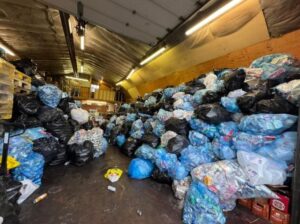
Woodlands County Council officially declared a state of Agricultural Disaster for the 2021 farming season during their regular meeting on September 21, following the Agricultural Services Board’s recommendation to do so. Manager of Agriculture Services for Woodlands County, Dawn Fortin, said the board decided to raise the issue following their meeting a few days prior. Fortin said that multiple problems led to the decision.
“Our crops, while they are coming off in good quality, the yields are much reduced. Being that there are shorter crops, there’s not going to be a lot of straw available for the livestock industry. Further to that, our forage crops are not doing well.” Fortin said that hay hasn’t done well either and that they are seeing below fifty percent yields on it. “So, our livestock producers are going to be facing feed shortages.”
She explained that, in addition, the conditions in the pastures are not good. “They are not recovering, so there’s not going to be as much fresh feed available for the livestock. We’re going to have to start feeding earlier due to that. This all stems from our summer. Everyone was here in the summer, so you know we had extremely hot, dry conditions through the summer, and that’s lead to the crop conditions that we have now.”
In the package that Fortin brought forward to Woodlands County Council, she included the Alberta Crop Report and multiple provincial maps, including pasture soil moisture, growing season precipitation, and the highest recorded temperatures in the province through June and July. The package also included a letter to the Office of the Minister of Agriculture and Forestry Devin Dreeshen, letting him know about the issues and the declaration.
Councillor Dale McQueen spoke first. “I think Dawn pretty well summed up everything that was discussed the other day. I think we hung on to this for a while looking at it and hoping that we would see some rain this summer and hopefully bring on our second cut.” As a farmer, McQueen understands the situation well. Though he said he didn’t know if the declaration would do anything beyond shed light on the situation, McQueen said he hopes it brings a little bit of hope to some of the producers in Woodlands County.
“We had no other choice. Producers were asking what’s going to happen, and I said, well, you won’t probably see anything from the province or the feds, but we’ve declared it, and that’s that, and we accept that it brings light to our situation. Maybe down the road, there will be something more. Most of the time, they just tell us that there are programs out there to take care of that, and we have a choice whether or not we want to use those programs. It’s a done deal. We will see what happens with it.”
McQueen also brought up a program available to Woodlands County livestock producers. “I would like to point out that we are under a certain area where there’s a tax deferral for the cattle this fall for some of the farmers, and we are right on the edge of that.” The Livestock Tax Deferral Provision allows farmers who sell part of their breeding herd due to natural disasters such as drought or flooding in certain regions to defer a portion of sale proceeds the following year. Only certain areas of the country fall under this program, and, thankfully, Woodlands County is right inside the cut-off line. To apply, the breeding herd must see a reduction of at least 15 percent.
Councillor Dale Kluin, also a farmer, said that the situation is only going to get worse for cow/calf farmers.” For those of you that don’t follow the markets, the price of grain right now, I was told, is somewhere between eight and nine dollars a bushel for barley. Those who haven’t been following the cow market, we’ve got a large number of producers right now selling their calves off one to two to three months earlier than normal. I’m watching every Thursday the calves going through the auction market, and normally they are selling in the 500-700lb range, these baby calves are going in at 250 to 300 pounds.”
He explained that though farmers are getting a high price for calves, the return back to the producer is next to nothing. “This last week, I had a discussion with the guys at the auction, and the feedlots, (they) basically said they are done. They will be buying some, but they are virtually full. They have to allow these baby calves to grow up, so they are full to capacity, and the price of calves is going down, so that only adds to the problem. It’s not going to get any better for our cow/calf guys. I hate to think about what it’s going to do to some of the younger guys. It’s just sad right now,” concluded Councillor Kluin.
Woodlands County Council voted unanimously to officially declare a state of Agricultural Disaster for the 2021 farming season.







More Stories
Community spirit shines at large-scale youth baseball event
Birthday party chaos sung beautifully by Pumpjack Players’ youth in spring musical
Gearing up for another season of cars, cruising and camaraderie